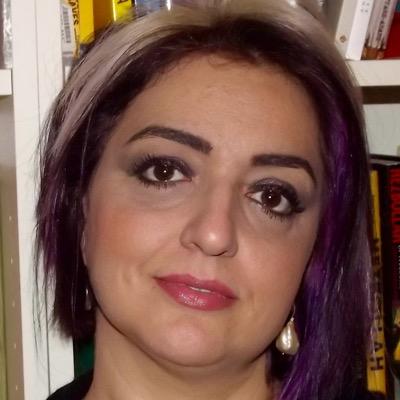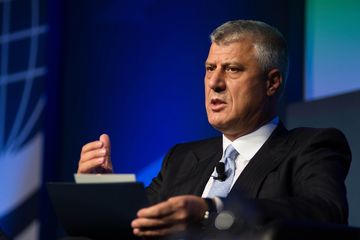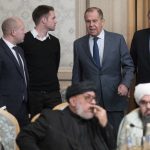On April 24, the Kosovo Specialist Prosecution Office (SPO) in the Hague asked for indictment for war crimes and crimes against humanity for the current president of Kosovo, Hashim Thaci, and Kadri Veseli actually the leader of the Democratic Party of Kosovo, alongside other people linked to the two politicians. According to the prosecution the indictment would hold Thaci and Veseli criminally responsible for nearly 100 murders: Kosovar ethnic Albanian, Serbian, Roma and others, during the war years in Kosovo and in the following months. The Prosecutor’s Office also communicated that “Mr Thaçi and Mr Veseli are believed to have carried out a secret campaign to overturn the law creating the Court and otherwise obstruct the work of the Court in an attempt to ensure that they do not face justice. By taking these actions, Mr Thaçi and Mr Veseli have put their personal interests ahead of the victims of their crimes, the rule of law, and all people of Kosovo”. It is the reason to issue this public notice after two months, last week, while the accusations are yet to be analyzed by the preliminary judge, who will have to decide whether to confirm the charges and open the process. The report was commissioned after the Council of Europe published an inquiry in 2011, which highlighted the criminal activities carried out by one of the cells of the UCK, “Drenica”, which included Thaci and Veseli. The charges mainly concern the post-war period when some people were allegedly killed and kidnapped to remove organs intended for international traffic. Thaci has strongly denied the allegations.
The Kosovo Specialist Chambers and Specialist Prosecutor’s Office were born in 2015 with the purpose to prosecute the alleged crimes committed by the KLA (Kosovo Liberation Army) against Albanian, Rome and Serbian civilians. The negotiations to establish the court lasted from 2011 until 2015. The Special Investigative Task Force (SITF) has conducted a large number of investigations since 2011. The court is a Kosovo’s court. It operates under Kosovo’s laws and it is formed with the intention of judging the perpetrators of the alleged crimes on the basis of what was collected by the SITF. Judges, prosecutors and the staff are international and are based in The Hague to guarantee its safety. Unlike the International Criminal Tribunal for the former Yugoslavia, this court is part of the Kosovar legal system, because it owes its foundation to a law approved by the parliament of Pristina. Despite this, the birth of the court was experienced in Kosovo as an imposition by the international community. Its birth is perceived by a part of the population and political exponents as an instrument aimed at punishing the Albanian population and its liberation struggle against the Slobodan Milošević regime and his policy of ethnic cleansing, exterminations and rape. To remind that Milosevic died of a heart attack only months before a verdict was due in his war crimes trial. Like him, many others have never paid for crimes committed in Kosovo.
The public notice, as we mentioned, was made last week in a particular moment. Just three days before the President Thaci was expected to visit the White House along with Serbian President Aleksandar Vučić. Nobody is so naive in believing it is a coincidence. It clearly seems to be a political decision. The court’s announcement was clearly made to prevent the White House meeting from taking place. The summit in Washington was intended to try to help the dialogue process between Belgrade and Pristina. The EU has tried for years to mediate between the two countries, but it has made very slow progress. Richard Grenell who is the U.S. special envoy for the talks has been very active in its efforts to continue the dialogue between the two countries.
The 1999 war in Kosovo left more than 10,000 dead and 1,641 are still unaccounted for. It ended after a 78-day NATO air raid with a strong commitment from the USA. Kosovo declared independence in 2008, but Serbia still does not recognize Kosovo’s declaration of independence. The EU would become the intermediary in the negotiations between Belgrade and Prishtina. But the EU talks stopped in November 2018 and never recovered. And it is after this moment that the figure of Richard Grenell is inserted. Unfortunately the relations and the collaboration between the EU and the Trump administration is no longer as before. The EU has appointed its own special envoy for dialogue between Kosovo and Serbia, the former Slovak foreign minister Miroslav Lajčák. It seems to have been little communication between the two envoyes for the dossier, Grenell and Ljacak. The negotiating meeting between presidents Thaci and Vucic in Washington (rather than in Brussels) would have been scheduled without any preliminary agreement with the EU. For a long time in the past months there has been talk of a territorial exchange plan between Serbia and Kosovo as part of the plan supported by the US, but Grenell has denied being aware of the existence of such a plan. Certainly the frictions between the EU and the US administration in this regard have been evident. Germany was explicit in believing that a territorial exchange plan would only ignite ethnic tensions in the Balkans.
What were the real reasons behind the timing of SPO is not clear, but certainly in this way the possibility of continuing the dialogue between Serbia and Kosovo in a short time has failed. The question remains when negotiations could resume and who of the two actors, EU or US will bring the deal at home. Kosovo remains very isolated after years. Five EU member States do not recognize its independence and the Visa’s liberalization appears to be the Penelope’s canvas. Vučić in Brussels made clear he wants an EU-sponsored dialogue. The EU has signaled it aims to restart the dialogue next month. But Kosovo would be the lame and the weak part. It is the first time that a Court has committed such an act against an incumbent President, when a preliminary jury has not yet confirmed the allegations for opening the trial. Thaci was not just any member of KLA, but its political director. The KLA was not a terrorist movement, but a liberation movement, a NATO ally in the war for the liberation of Kosovo. And the risk of the analyzes is that there is a tendency to equate individual war crimes committed by people in Kosovo with a multi-year state policy that has conducted ethnic cleansing and killings towards a civilian population. Obviously even those who among politicians, analysts, intellectuals, young and old people, who in recent years have been opponents of the political line of Thaci & Co, opponents of the way of doing politics of all the ex-commanders of the war, will not be able to accept lightly the decision of a Court that puts politics before justice.
Author
-

Researcher on International Relations Middle East and Balkans
View all posts
CSSII- Centro Interdipartimentale di Studi Strategici, Internazionali e Imprenditoriali,
Università di Firenze, Italy, Albania




